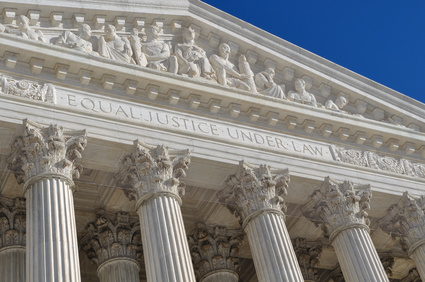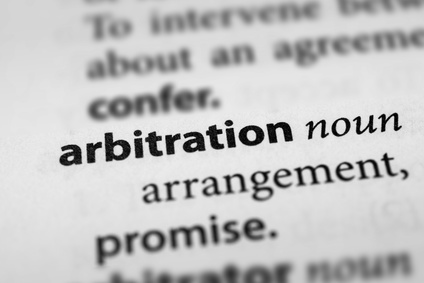Yesterday’s decision from the U.S. Supreme Court in Spokeo v. Robins should bolster the defense of companies subject to several federal consumer protection statutes. The ruling addresses lawsuits that claim an injury created solely by the violation of a federal statute and require the plaintiff to demonstrate not only that the statute was violated, but that the plaintiff herself suffered harm. The opinion does not go as far as many in the consumer financial services industry would have liked (not all injuries must be “tangible”), but it does close the door on civil lawsuits many have faced. The opinion was…
Posts published in May 2016
In a unanimous decision yesterday, the U.S. Supreme Court held that attorneys retained as independent contractors by the Ohio Attorney General to collect debts owed to the state do not violate the federal Fair Debt Collection Practices Act (FDCPA) when sending collection letters on Attorney General letterhead. In so ruling, the Court noted that the FDCPA “bars debt collectors from deceiving or misleading consumers; it does not protect consumers from fearing the actual consequences of their debts.” Authored by Justice Ginsburg, a copy of the opinion in Sheriff v. Gillie is available here: Link to Opinion. Under Ohio law, debts owed…
The District Court of Appeal of Florida, Fourth District, recently upheld a trial court’s ruling that a plaintiff mortgage loan servicer had authority to initiate foreclosure proceedings against borrowers on a mortgage loan evidenced by an electronic note. The Fourth DCA also held that the e-note was a transferable record under the Uniform Electronic Transactions Act. A copy of the opinion in Rivera v. Wells Fargo Bank, NA is available at: Link to Opinion. In April 2008, the borrowers executed an electronic note (“e-note”) in favor of the lender, evidencing a loan secured by a mortgage. In January 2010, the servicer…
The Court of Appeal of the State of California, First Appellate District, recently upheld a trial court’s demurrer without leave to amend in a case in which a judicially noticed Purchase and Assumption Agreement (“P&A Agreement”) contradicted the borrower’s allegations that a subsequent purchaser of the loan had no authority to foreclose on her property. A copy of the opinion in Brown v. Deutsche Bank National Trust Company as Trustee for WAMU Mortgage Pass-Through Certificates Series et al. can be found at: Link to Opinion. In 2004, a borrower obtained a $450,000 loan secured by a deed of trust recorded against…
The U.S. Court of Appeals for the Fifth Circuit recently affirmed the dismissal of a borrower’s claims against her lender arising out of a foreclosure, holding among other things that alleged discrepancies as to the lender’s automatic payment withdrawal services did not state a claim under the Texas Deceptive Trade Practices Act (DTPA). In so ruling, the Court also affirmed the denial of a plaintiff borrower’s motion to join a non-diverse defendant holding that the motion was improperly brought for the purpose of defeating diversity jurisdiction. A copy of the opinion in Villarreal v. Wells Fargo Bank, NA is available at:…
7th Cir. Holds Customer Did Not Agree to Online Contract, Adopts ‘Reasonable Communicativeness’ Test

The U.S. Court of Appeals for the Seventh Circuit recently held that, under Illinois law, a website must provide a user reasonable notice that use of the website and a click on a button constitutes assent to the terms of an agreement, in order for the agreement to be binding. In so ruling, the Seventh Circuit adopted a two-part “reasonable communicativeness” test for the enforceability of online agreements: (1) whether the web pages presented to the customer adequately communicated all of the terms and conditions of the agreement; and (2) whether the circumstances support the reasonable assumption that the customer…
Join me on June 2 for a live webinar when I will be among a panel of plaintiff and defense attorneys discussing developments and trends in consumer finance class actions, including the Gillie and Spokeo U.S. Supreme Court cases. During the webinar, we will present effective strategies and approaches for pursuing or defending claims alleging violations of federal consumer protection laws governing the financial services industry, including the Fair Debt Collection Practices Act (FDCPA), Fair Credit Reporting Act (FCRA), Telephone Consumer Protection Act (TCPA) and other similar statutes and regulations. In addition, we will offer guidance on how to navigate the thorny…
The U.S. Court of Appeals for the Seventh Circuit recently held that a mortgagor is not a third-party beneficiary under a pooling and servicing agreement under New York law, and therefore lacks standing to challenge purported violations of assignments under the agreement. A copy of the opinion in In re Jepson is available at: Link to Opinion. A borrower executed a note for a loan secured by a mortgage. The note was indorsed by the lender in blank and transferred to a residential mortgage-backed securities trust formed and governed by a pooling and servicing agreement (“PSA”). The trust’s trustee held the…
The U.S. District Court for the Western District of New York recently held that claims under the federal Telephone Consumer Protection Act (TCPA), 47 U.S.C. § 227, et seq., are penal in nature and therefore do not survive the death of a plaintiff. In so ruling, the Court held that the TCPA’s provision of damages in the amount of $500 per phone call, which could be trebled up to $1,500, is “wholly disproportionate to the harm suffered.” Of note, the Due Process Clause of the Fourteenth Amendment of the U.S. Constitution prohibits the imposition of “grossly excessive or arbitrary punishments…
The Third District Court of Appeal, State of Florida, recently reversed a final judgment of foreclosure because the plaintiff mortgagee alleged the same payment default as the basis for its prior 2008 and 2014 foreclosure actions. The Third DCA held that on remand the trial court should calculate the correct amount owed for principal and interest, excluding installments that became due more than five years prior to the filing of the second foreclosure action, in accordance with its en banc ruling in Deutsche Bank Trust Co. Americas v. Beauvais. A copy of the opinion in Collazo v. HSBC Bank USA, N.A. is…
The U.S. District Court for the Northern District of California recently held that an amendment to the federal Telephone Consumer Protection Act (TCPA) enacted as part of the Bipartisan Budget Act of 2015 applies to calls made in 2014 “solely to collect a debt owed to or guaranteed by the United States,” and therefore granted summary judgment in favor of the defendant. A copy of the opinion in Silver v. Pennsylvania Higher Education Assistance Agency is available at: Link to Opinion. The plaintiff filed a putative class action under the TCPA alleging that, in or around January 2014, the defendant student…
The Consumer Financial Protection Bureau has released a proposal to prohibit creditors from using arbitration clauses to block class action litigation. The Bureau’s proposed ban is not surprising. However, it will only impact arbitration agreements concerning covered consumer financial products or services entered into after its effective date. Arbitration Clauses and Class Action Waivers Arbitration is an effective means for consumers to vindicate their claims in an informal setting. Through the informal setting of arbitration, consumers are not restricted by court rules of evidence and procedure that could otherwise limit or even prevent the assertion of particular claims or the use…











